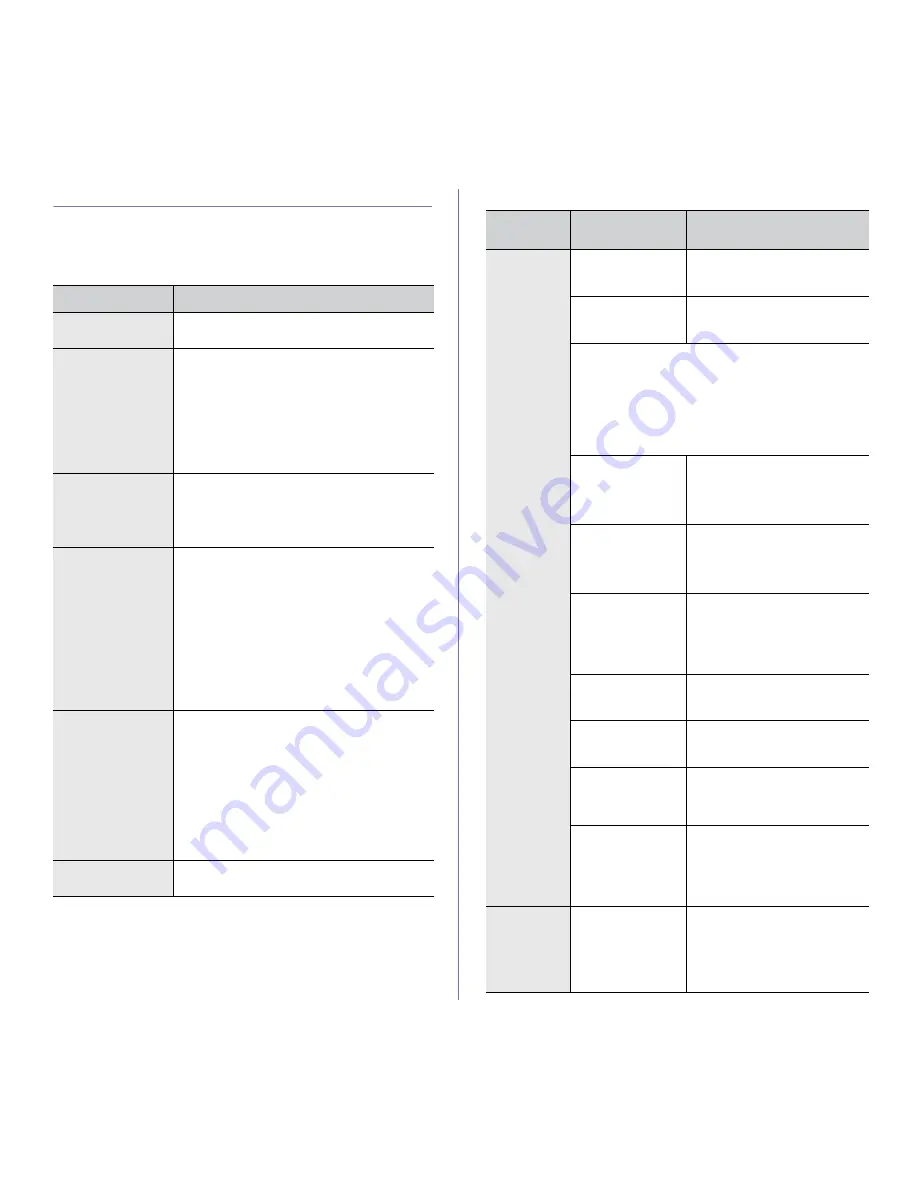
Troubleshooting
_ 75
SOLVING OTHER PROBLEMS
The following chart lists some conditions that may occur and the
recommended solutions. Follow the suggested solutions until the problem is
corrected. If the problem persists, call for service.
Paper feeding
Printing problems
CONDITION
SUGGESTED SOLUTIONS
Paper is jammed
during printing.
Clear the paper jam. See page 69.
Paper sticks
together.
•
Ensure there is not too much paper in the tray.
The tray can hold up to 250 sheets of paper,
depending on the thickness of your paper.
•
Make sure that you are using the correct type
of paper. See page 38.
•
Remove paper from the tray and flex or fan the
paper.
•
Humid conditions may cause some paper to
stick together.
Multiple sheets of
paper do not feed.
•
Different types of paper may be stacked in the
tray. Load paper of only one type, size, and
weight.
•
If multiple sheets have caused a paper jam,
clear the paper jam. See page 69.
Paper does not feed
into the machine.
•
Remove any obstructions from inside the
machine.
•
Paper has not been loaded correctly. Remove
paper from the tray and reload it correctly.
•
There is too much paper in the tray. Remove
excess paper from the tray.
•
The paper is too thick. Use only paper that
meets the specifications required by the
machine. See page 33.
•
If an original does not feed into the machine,
the ADF rubber pad may require to be
replaced. See page 66.
The paper keeps
jamming.
•
There is too much paper in the tray. Remove
excess paper from the tray. If you are printing
on special materials, use the manual tray.
•
An incorrect type of paper is being used. Use
only paper that meets the specifications
required by the machine. See page 33.
•
There may be debris inside the machine. Open
the front cover and remove the debris.
•
If an original does not feed into the machine,
the ADF rubber pad may require to be
replaced. See page 66.
Envelopes skew or
fail to feed correctly.
Ensure the paper guides are against both sides of
the envelopes.
CONDITION
POSSIBLE
CAUSE
SUGGESTED SOLUTIONS
The machine
does not
print.
The machine is not
receiving power.
Check the power cord
connections. Check the power
switch and the power source.
The machine is not
selected as the
default printer.
Select Xerox WorkCentre 3210 or
WorkCentre 3220 as your default
printer in your Windows.
•
Check the machine for the following:
•
The front cover is not closed. Close the cover.
•
Paper is jammed. Clear the paper jam. See page 70.
•
No paper is loaded. Load paper. See page 37.
•
The print cartridge is not installed. Install the print
cartridge.
•
If a system error occurs, contact your service
representative.
The connection
cable between the
computer and the
machine is not
connected properly.
Disconnect the printer cable and
reconnect it.
The connection
cable between the
computer and the
machine is
defective.
If possible, attach the cable to
another computer that is working
properly and print a job. You can
also try using a different printer
cable.
The port setting is
incorrect.
Check the Windows printer setting
to make sure that the print job is
sent to the correct port. If the
computer has more than one port,
make sure that the machine is
attached to the correct one.
The machine may
be configured
incorrectly.
Check the printer properties to
ensure that all of the print settings
are correct.
The printer driver
may be incorrectly
installed.
Repair the printer software. See
the
Software section.
The machine is
malfunctioning.
Check the display message on
the control panel to see if the
machine is indicating a system
error.
The document size
is so big that the
hard disk space of
the computer is not
enough to access
the print job.
Get more hard disk space and
print the document again.
The machine
selects print
materials
from the
wrong paper
source.
The paper source
selection in the
printer properties
may be incorrect.
For many software applications,
the paper source selection is
found under the
Thin Paper
tab
within the printer properties.
Select the correct paper source.
See the printer driver help screen.
















































